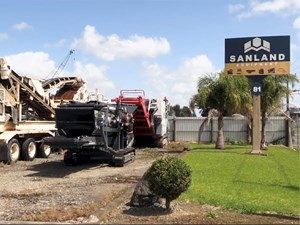Comment: Becoming a truck driver in NZ
Are you looking for a career that offers long-term security and a good income? Have you thought of becoming a truck driver?
With today’s modern technology, trucks are as comfortable and easy to drive as a modern car, with many safety features as standard equipment. Gone are the days when physical strength was one of the requirements. Today’s truck drivers are skilled professionals.

Every day, you have an ever-changing view out of the truck’s window as you are paid to travel around this beautiful country of ours, meeting new people, while you listen to your own choice of music. If this is appealing, then becoming a truck driver may just be the career you are looking for.
Truck drivers are in great demand. New Zealand, along with many other countries including Australia, the United States and the United Kingdom, is facing massive shortages of qualified truck drivers. The situation is not going to change in the near future, with the freight task in New Zealand expected to grow by 50% over the next 30 years, creating even more demand.
Being a truck driver can be demanding. The hours for some can be long, although this is regulated to a maximum of 70 hours per week. On the plus side, the more hours you work, the more you get paid.
So, what do you need to become a truck driver?
The first thing you will need is a can-do attitude, a great work ethic, flexibility, patience, strong intuition, good people skills, the ability to get out of bed each day regardless of the day’s start time, don’t mind being away from home, a clean licence, the ability to pass a pre-employment drug and alcohol test along with regular random testing, the ability to work on your own without constant management, and the ability to think for yourself.
There are many types of truck-driving jobs:
Metro truck driver. Typically you are driving within the city. You would usually expect to be home each night.
Regional truck driver. This would typically be within a geographical area, possibly route delivery or short distance between centres, say Christchurch to Timaru return each day. You would usually expect to be home each night.
Linehaul truck driver. This would typically be long distance between centres, say between Christchurch and Nelson return. If this is a trailer-swap situation, you might be home each night. If there is loading and delivery along the way, you would expect to be away for the night. This typically involves long hours per week.
Floater fleet truck driver. This is typically a long-distance load-and-go situation where you never know from one day to the next which direction you are going. This typically involves long hours, and many days, sometimes weeks, away from home.
Specialised truck driver. These drivers require specific skills and include tanker, dangerous goods, heavy haulage, livestock, crane operator, container side loader, refrigerated, log transport, recovery vehicle, and house movers.
To become a truck driver, you will first need a clean class 1 full licence (car licence) before you can apply to obtain a truck driver licence. There are four classes of truck driver licences, plus a number of licence endorsements:
Class 2—medium rigid vehicle.
This is a vehicle that has a gross laden weight of more than 6000kg but not more than 18,000kg. To get a class 2 learner licence, you must have held a class 1 full licence for at least six months, present a medical certificate and pass a theory test.
To get a class 2 full licence, you must have held a class 2 learner licence for at least six months, present a medical certificate and pass a practical driving test. This time can be shortened by passing an approved training course.
Class 3—medium combination.
This is a combination vehicle with a gross combination weight of more than 12,000kg but not more than 25,000kg. To get a class 3 learner licence you must have held a class 2 full licence for at least six months (or three months if you are aged over 25), present a medical certificate and pass a theory test.
To get a class 3 full licence you must have held a class 3 learner licence for at least six months, present a medical certificate and pass a practical driving test. This time can be shortened by passing an approved training course.
Class 4—heavy rigid vehicle.
This is a rigid vehicle with a gross laden weight of more than 18,000kg. To get a class 4 learner licence you must have held a class 2 full licence for at least six months (or three months if you are aged over 25) and present a medical certificate.
To get a class 4 full licence you must have held a class 4 learner licence for at least six months (there is no time restriction if you are aged over 25 and pass an approved course), present a medical certificate and pass a practical driving test.
Class 5—heavy combination.
This is a combination vehicle with a gross combination weight of more than 25,000kg.
To get a class 5 learner licence you must have held a class 4 full licence for at least six months (or three months if you are aged over 25 years), present a medical certificate and pass a theory test. This time can be shortened by passing an approved training course.
To get a class 5 full licence you must have held a class 5 learner licence for at least six months, present a medical certificate and pass a practical driving test. This time can be shortened by passing an approved training course.
Job security
Truck drivers usually earn between $18 and $30 per hour, sometimes even more. This is dependent on the class of truck, type of work and your experience. Your income will usually be based on the number of hours per week you work and can be paid as a salary or an hourly rate.
There are many ways to find a job as a truck driver. Many employers will advertise on Trade Me Jobs, Seek, Facebook or on their own company website.
If you are looking for a truck-driving job or to start a career as a truck driver, there is nothing wrong with the old-fashioned approach of knocking on the doors of trucking companies to see if they have any vacancies.
Many of the larger firms run cadetship programmes that will assist with the training costs for people who pass their entry criteria.
Driving a truck is a great career that is interesting, rewarding and well paid, with an amazing camaraderie among those within the industry.
Keep up to date in the industry by signing up to Deals on Wheels' free newsletter or liking us on Facebook.





.jpg)


.jpg)








